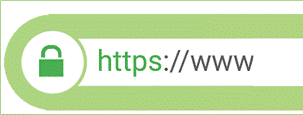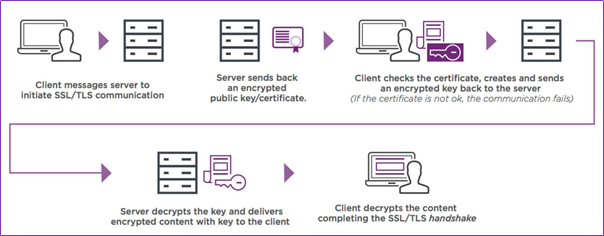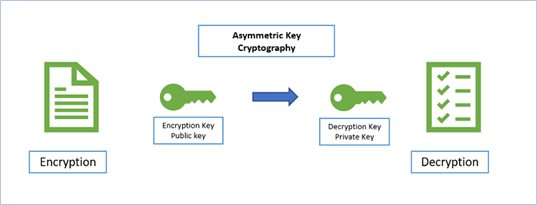Since digitalization has started becoming more popular than the physical world, cyber-security has become a discussion topic. Cyber-security or web-security as you name it is the process involved in safeguarding computers, laptops, networks, servers and software. Cyber-security solutions protect all the data stored in these devices.
Hence cyber-security is essential for all businesses, i.e., banks, financial institutions, government sectors, health-care industries, and other companies. Strong and effective cyber-security measures will secure your site and data efficiently and keep cyber-criminals away.
SSL Certificate is a web security solution that establishes an encrypted link between browser and server and secures the web.
What is an SSL Certificate?
SSL is an abbreviation for Secure Socket Layer. It is a digital certificate installed on the website to secure the communications between the browser (client) and the server.
The main motto of SSL protocol is to encrypt and decrypt data that is transmitted across website servers and browsers. It also secures communications made on email as well as on unsecured networks. The latest SSL version is known as TLS (Transport Layer Security) and functions similar to SSL.
This digital certificate contains the organization name, address, domain name, hostname, etc., and uses cryptographic keys to secure data.
Many new users frequently ask the below Question
How do I know whether a site is secured or not?
When an SSL certificate is installed on a website, the site is secured with encryption. But the next question is:
How does a layman know whether an SSL certificate is installed on the site or not? How does he/she know whether the site they are accessing is safe or not?
The answer lies in the trust indicators displayed by SSL certificates. When an SSL certificate is installed on a website, it shows two trust symbols, i.e. padlock in the URL and HTTPS (Hypertext Transfer Protocol Secure) in the address bar.

Since SSL authenticates the website and data, Google made SSL adoption, a compulsion for all websites, in 2018. This step taken by Google motivated all the popular browsers to term HTTP (Hypertext Transfer Protocol) sites as “Not Secure” when any user approaches the same.
Research by NTSC and Check Point Software Security Report 2020, indicates the following.
1. Hackers put 127 new million records for sale – Hacker News, February 15, 2019
2. 800 million emails were leaked – Security Discovery, March 7, 2019
3. The 773 million record data breach occurred– Troy Hunt, January 17, 2019
These figures themselves are enough to state the significance of SSL certificates and why web owners and browsers prefer HTTPS.
Why SSL Is important?
Why do you hire a security guard to protect your home? It is mainly for safeguarding yourself and your finances against intruders.
Similarly, web owners install an SSL Certificate to safeguard their site and customer data from hackers and cyber-criminals.
The 3 fundamental benefits of an SSL Certificate are as below.
- Encryption
- Authentication
- Data Integrity
Encryption
SSL Certificates encrypt the client’s data-in-transit (browser) and website, thus initiating a secured session.
Hence SSL Certificate is not an option, but a necessity for securing your website.
When communication is made over HTTP, it is routed through an unencrypted channel, easily compromised by hackers. This puts your sensitive information at risk.
In HTTPS, the communication is locked with a public key, and it travels in a coded format. Only the intended recipient of the message has a private key to unlock the message. Thus, SSL certificates provide end-to-end security to your site information.
Authentication
SSL certificates ensure that the message is delivered to the intended recipient and there are no MITM (Man-in-the-middle) attacks. It authenticates and ensures that the message is communicated to the intended server, thus preventing intruders from imitating genuine sites.
Data Integrity
These digital certificates also ensure that the data is not tampered with during the communication process.
Apart from the above benefits, a few more include:
- A rise in SEO ranks
- Improves customer trust factors
- Prevents phishing attacks
- Secures customer payments and other information
- Authenticates your identity
- Fulfils PCI DSS (Payment Card Industry Data Security Standard) Compliance
How SSL Certificates work to protect your Website?
The entire encryption process works on two keys, i.e., the public key and the private key. The SSL certificate comprises these keys, the owner’s name, and other details.
It would help if you generated a CSR (Certificate Signing Request) to get an SSL certificate for a website. This CSR data file is sent to the Certificate Authority (CA) to issue the SSL Certificate.
Depending on the type of SSL certificate requested by the owner, the CA executes the verification process and issues the SSL certificate. The web owner installs the same on the server to secure their website.

All SSL certificates issued to website owners are digitally signed by CA’s, and most browsers trust those SSL certificates issued by trustworthy CA’s.
The browser and the server communicate with each other to start an encrypted exchange of data.
The Process to begin an Encrypted Communication
1. The browser (client) attempts to connect to a website (server) with an SSL certificate installed.
2. The browser then appeals to the server to identify itself and requests for a connection.
3. The server sends a copy of its SSL certificate to the browser.
4. The browser verifies the authenticity of the SSL certificate and later sends a message to the server.
5. The web server later sends an acknowledgement in the form of a digital signature for starting an encrypted session.
6. Later, encrypted communication is started between both parties.
SSL Encryption
To secure your web with encryption, it is essential to know how SSL encryption works.
SSL encryption mainly works with Asymmetric Cryptography (Asymmetric Encryption) wherein a pair of keys generated with mathematical algorithms are used to encrypt and decrypt data. One key is the Public Key which is used to encrypt the data, and the other one is the Private Key which is used to decrypt the data.
The public key is shared amongst many users, whereas the private key is only with the intended recipient who can decrypt the message.

Process
1. An encrypted communication begins with SSL/TLS Handshake, wherein both the parties (browser and server) exchange public keys.
2. During the SSL handshake process, session keys are generated by both parties, and these keys help in the encryption-decryption process.
3. Different session keys are used for different sessions to encrypt data.
4. SSL also ensures that the website and the site owner are legitimate parties.
5. It also ascertains that the data is not tampered with, by intruders.
6. An inclusion of MAC (Message Authentication Code) in exchanging information, is used to ensure that the data is not compromised.
Note – All SSL certificates come with an expiry date, and you need to renew your SSL Certificates from your SSL service provider for the smooth and safe functioning of your website.
Final Thoughts
With the rise in cyber-threats and daily increase in data breaches, implementing cyber-security measures is the only solution. These measures ensure that your devices, websites and networks remain secure and safe from hackers.
Would you feel safe if your browser is prompting the warning signal – “Not Secure”? That’s a warning stating that the website you wish to access is not installed with an SSL certificate.
Web security awareness is increasing, and many users are aware of the difference between HTTPS and HTTP. SSL certificates have their trust icons, but security and trust are also two significant factors which make SSL certificates popular and necessary.
Many cheap SSL certificate providers in the market sell SSL certificates at quite reasonable rates. ClickSSL is one such trusted name with all the various brands of SSL certificates like Comodo, RapidSSL, GeoTrust, Thawte, etc. Their attractive offers, unbeatable quality, excellent customer support team, money back offers, etc., and other VAS services like generating CSR, installing SSL certificate, SSL checker, etc. are worth noting. Hence web owners love to buy SSL certificates from ClickSSL, for fulfilling their web security requirements.

